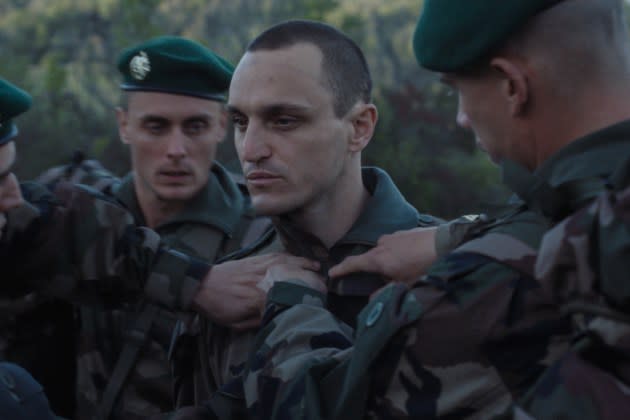‘Disco Boy’ Review: Franz Rogowski Does ‘Beau Travail’ in a Dreamy Legionnaire Odyssey
- Oops!Something went wrong.Please try again later.
- Oops!Something went wrong.Please try again later.
- Oops!Something went wrong.Please try again later.

Giacomo Abbruzzese’s debut feature is a hazily seductive, frequently dreamlike study of life in the French Foreign Legion, fixated on masculine bodies in synchronized and sometimes violently clashing motion. It is also called “Disco Boy.” You almost certainly wouldn’t choose that subject, tone and title for a film if you didn’t want viewers’ minds to immediately wander to “Beau Travail,” Claire Denis’ seminal Foreign Legion cine-ballet, with its climactic solo number set to a thumping Eurodance classic; even if you somehow made that error, you wouldn’t compound it with electro-scored terpsichorean interludes of your own. Choosing homage this direct for a first feature is a brazen move, but notwithstanding its openly derivative qualities, “Disco Boy” doesn’t want for boldness or surprise — Abbruzzese’s hot, fluxional command of sound and image keeps us curious.
One feature of “Disco Boy,” at least, plays as expected: the reliably fragile, fascinating presence of Franz Rogowski, the gifted German actor who, of late, seems to have evolved into a border-busting mascot for European cinema at its most sinuous and supple. As in Christian Petzold’s out-of-time 2018 refugee tale “Transit,” Rogowski here plays a man slipping between personal and national identities, shedding past selves in the shadows. He’s ironically persuasive in such roles not because of how he blends in but how he stands out. His beautiful, off-kilter features and soft, sibilant voice don’t evoke any particular place or personal history; he fits everywhere and nowhere. In this French-Italian-Belgian-Polish production set across two continents, that’s fitting enough.
More from Variety
'The Teachers' Lounge' Review: Lessons Are Taught and Taut in a Gripping Classroom-Ethics Thriller
French Documentary 'On the Adamant' Wins Golden Bear at Berlin
To be identified as part of any community, it seems, is anathema to his character Aleksei, a taciturn Belarusian drifter with a mural of intricate prison tattoos on his torso. We first encounter him on a raucous bus packed with chanting Belarusian football fans, crossing the border into Poland for a match, but it’s clear from the outset that Aleksei and his close friend Mikhail (Michał Balicki) have a different agenda from the braying men around them. Soon enough, they break from the pack and embark on a perilous cross-continental trek toward France. Mikhail doesn’t make it.
Aleksei mourns his friend, but his innate lone-wolf instincts take over — leading him, somewhat counterintuitively, into the French Foreign Legion, where he joins a motley crew of multinational wastrels seeking to join a corps that will ultimately grant them French citizenship. Aleksei is no more a natural citizen than he is a soldier, but the promise of security, or at least of stillness, appeals to him. Wiry and resolute, he passes basic training, while in no way becoming one of the boys.
On a hostage rescue mission to Nigeria, he crosses paths with Niger Delta rebel fighter Jomo (Morr Ndiaye), and grisly military business takes its course. The notion of duty does little to allay the persistent air of haunting, by bodies crossed and killed, that descends on the reluctant legionnaire — as “Disco Boy,” already a film with its own jagged grasp on reality, morphs into an oblique post-colonial ghost story of sorts, guided by its protagonist’s erratic moods and visions. Though Jomo has the certainty of heritage and mission that Aleksei lacks, the two men are mutually failed by the order and orders of military patriarchy. Consigned to the dim backstreets and nightclubs of Paris, in this life or the next, Jomo’s sister Udoka (Laëtitia Ky) matches Aleksei’s immigrant ennui and unrest.
In telling this slim but elliptical story across a pleasingly brisk 90 minutes, the Italian-born Abbruzzese varies the pitch of his messaging from glancingly light to brashly on-the-nose, sometimes from one scene to the next. You hardly need a degree in semiotics to read a shot of a burning army-base locker beside a wall painting of the Foreign Legion’s creed, proclaiming a soldier’s Frenchness “not by the blood he inherited, but the blood he shed.” The film’s politics are hardly more subtly specified than its creative influences, which run the gamut from Denis’ whispery sensualism to the blunter, more brutish allegorical poetry of Pedro Costa and Albert Serra, albeit with a fluorescently queer ripple running through things.
Still, the filmmaker’s glittering, sometimes hypnotic mise-en-scène isn’t writing checks he can’t cash. There’s confident brio and imagination behind the imagery here, immaculately realized as it is by ever-versatile DP Hélène Louvart, who finds light and movement even in khaki-hued murk, and can locate exactly the right mirrored forms and buried jewels of color to bridge environments as disparate as a blazing African delta and a spangly Parisian superclub.
There’s method even to Abbruzzese’s cockiest, most show-offy flourishes: in the heat of battle, a switch-flip into garish, chemical night vision initially seems an eye-searing gimmick, until its blurring of bodies into indistinguishable masses plainly makes its point. A driving, feverish synth score by French DJ Vitalic (aka Pascal Arbez-Nicolas) fills and frazzles the brain, putting us in Aleksei’s increasingly hopeless position of seeking serenity at any cost. Even when “Disco Boy” threatens to be too much or too little, however, Rogowski’s strange, sparse, plaintive performance keeps its soul intact, and its most poignant query afloat above all the flash and dazzle and neon lights: just how much of themselves people will sacrifice for a paper identity.
Best of Variety
Sign up for Variety’s Newsletter. For the latest news, follow us on Facebook, Twitter, and Instagram.
